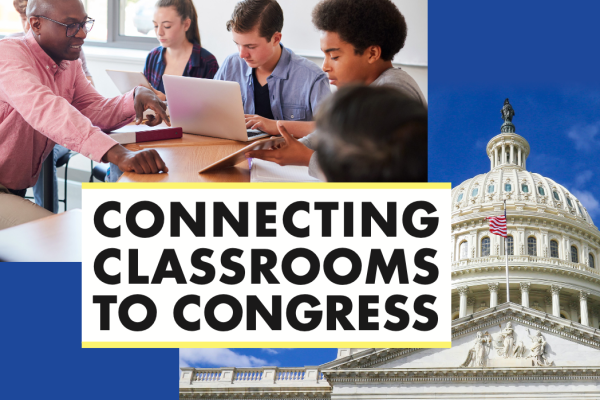IDEA Celebrates Entering Third Year of Connecting Classrooms to Congress Initiative

IDEA and our partners at Columbia University and the University of California Riverside are incredibly excited with the progress made in the second year of a grant funded by the Institute of Education Sciences (IES). The project developed and tested a web-based platform that enables high school students to study a pressing political issue and then discuss that issue with their Member of Congress in a Deliberative Town Hall. After completing the curriculum and participating in the DTH, students reflect on that event through analytical writing and continue the conversation within their classes and the broader community.
In the second year of the grant, the team accomplished several goals:
Our team hosted five Town halls with the following members of Congress:
Representative Aaron Bean (FL 4th District, Republican)
Representative Barbara Lee (CA 12th District, Democrat)
Representative Brad Schneider (IL 10th District, Democrat)
Representative Mark Takano (CA 29th District, Democrat)
Representative Lauren Underwood (IL 14th District, Democrat)
The number of teachers participating in the project expanded to include a total of 13 teachers in 9 high schools in school districts in California, Florida, and Illinois. The teachers participated in four professional development sessions.
The team revised and improved the curriculum based on teacher and student feedback. We also created two new issue guides in addition to refining the one used in our first year. Schools are now able to choose between three topics: Climate Choices, Social Media, and Work and Pay.
The TeCD-Lab at UCR has continued to improve Prytaneum, which is the online town hall platform designed to give participants more robust opportunities to engage with elected officials on substantive issues.
As we look towards the third year of the project, we will expand to include additional sites in California, Florida, and Illinois and plan to add new sites in Ohio, Washington, and Wisconsin. Additionally, we plan to conduct a rigorous research study looking at the impact of the curriculum by measuring students’ gains in analytical knowledge, written communication, and integrative complexity. We will also analyze student writing using the Civically Engaged Writing Analysis Continuum. Finally, we will continue to explore teachers’ and students’ experiences of the curriculum via classroom observations, focus groups, and interviews to help us understand how to integrate and scale such an initiative in future years.
You can learn more about our work with Connecting Classrooms to Congress here.
